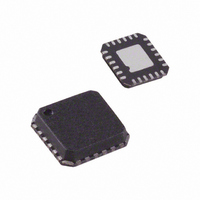ADL5370ACPZ-R7 Analog Devices Inc, ADL5370ACPZ-R7 Datasheet - Page 14

ADL5370ACPZ-R7
Manufacturer Part Number
ADL5370ACPZ-R7
Description
IC,RF Modulator,LLCC,24PIN,PLASTIC
Manufacturer
Analog Devices Inc
Datasheet
1.ADL5370ACPZ-R7.pdf
(20 pages)
Specifications of ADL5370ACPZ-R7
Design Resources
Interfacing ADL5370 to AD9779A Dual-Channel, 1 GSPS High Speed DAC (CN0016)
Function
Modulator
Lo Frequency
250MHz ~ 1.45GHz
Rf Frequency
300MHz ~ 1GHz
P1db
11dBm
Noise Floor
-160dBm/Hz
Output Power
6.2dBm
Current - Supply
210mA
Voltage - Supply
4.75 V ~ 5.25 V
Test Frequency
450MHz
Package / Case
24-VFQFN, 24-CSP Exposed Pad
Lead Free Status / RoHS Status
Lead free / RoHS Compliant
Other names
ADL5370ACPZ-R7TR
Available stocks
Company
Part Number
Manufacturer
Quantity
Price
Company:
Part Number:
ADL5370ACPZ-R7
Manufacturer:
ADI
Quantity:
1 190
Company:
Part Number:
ADL5370ACPZ-R7
Manufacturer:
Analog Devices Inc
Quantity:
1 875
ADL5370
USING THE AD9779 AUXILIARY DAC FOR CARRIER
FEEDTHROUGH NULLING
The
inject small currents into the differential outputs for each main
DAC channel. This feature can be used to produce the small
offset voltages necessary to null out the carrier feedthrough
from the modulator. Figure 33 shows the interface required
to utilize the auxiliary DACs. This adds four resistors to the
interface.
Figure 32. DAC Modulator Interface with 3 MHz Third-Order Low-Pass Filter
AD9779
AD9779
OUT1_P
OUT1_N
OUT2_N
OUT2_P
AD9779
AUX1_P
OUT1_P
OUT1_N
AUX1_N
AUX2_N
OUT2_N
OUT2_P
AUX2_P
Figure 33. DAC Modulator Interface with Auxiliary DAC Resistors
92
92
93
90
500Ω
93
500Ω
500Ω
84
83
89
500Ω
87
84
83
86
features an auxiliary DAC that can be used to
RBQN
RBQN
RBQP
RBQP
RBIN
RBIN
RBIP
RBIP
50Ω
50Ω
50Ω
50Ω
50Ω
50Ω
50Ω
50Ω
250Ω
250Ω
250Ω
250Ω
1.1nF
1.1nF
1.1nF
1.1nF
C1Q
C1Q
C1I
C1I
2.7nH
2.7nH
2.7nH
2.7nH
2.7nH
2.7nH
2.7nH
2.7nH
LNQ
LNQ
LPQ
LPQ
LPI
LPI
LNI
LNI
1.1nF
1.1nF
1.1nF
1.1nF
C2Q
C2Q
C2I
C2I
RSLQ
RSLQ
100Ω
100Ω
100Ω
100Ω
RSLI
RSLI
23
24
23
24
19
20
19
20
ADL5370
QBBN
ADL5370
QBBN
QBBP
QBBP
IBBN
IBBN
IBBP
IBBP
Rev. 0 | Page 14 of 20
GSM OPERATION
Figure 34 shows the GSM EVM and spectral mask performance
vs. output power for the ADL5370 at 450 MHz. For a given LO
amplitude, the performance is independent of output power.
Figure 35 shows the GSM EVM, spectral mask performance
and 6 MHz offset noise vs. LO amplitude at 450 MHz with an
output power of 6 dBm. Increasing the LO drive level improves
the noise performance but degrades EVM performance.
Figure 35 illustrates that an LO amplitude of 0 dBm provides
the ideal operating point for noise and EVM for a GSM signal
at 450 MHz.
Figure 35. GSM EVM, Spectral Performance, and 6 MHz Noise Floor vs.
Figure 34. GSM EVM and Spectral Performance vs. Channel Power at
–105
–112
–35
–42
–49
–56
–63
–70
–77
–84
–91
–35
–42
–49
–56
–63
–70
–77
–84
–91
–98
–6
0
6 MHz OFFSET NOISE
450 MHz vs. Output Power; LO Power = 0 dBm
LO Power at 450 MHz; Output Power = 6 dBm
250kHz
EVM
400kHz
EVM
250kHz
1
–4
RMS
PK
(%)
(%)
2
EVM
OUTPUT POWER (dBm)
–2
LO AMPLITUDE (dBm)
400kHz
RMS
3
(%)
0
1200kHz
EVM
4
PK
600kHz
2
(%)
5
1200kHz
600kHz
4
6
7
6
2.0
1.5
1.0
0.5
0
3.1
2.9
2.7
2.5
2.3
2.1
1.9
1.7
1.5
1.3
1.1
0.9













